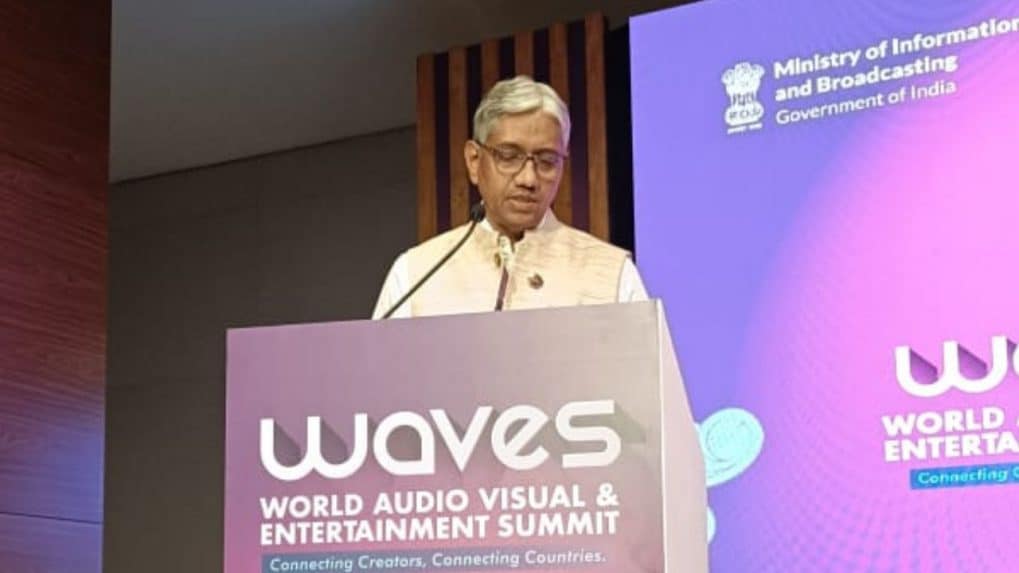"Don't want to create regulation that discriminates between traditional, digital mediums": Anil Kumar Lahoti of TRAI
Speaking to Storyboard18 at the sidelines of WAVES 2025, Anil Kumar Lahoti, Chairman of TRAI pointed to a complete revamp of the licensing system for both television and radio under the new Telecommunication Act, aimed at simplification and harmonisation of terms, enhancing ease of doing business, and making regulations more technology-agnostic.
ADVERTISEMENT
At the World Audio Visual Entertainment Summit (WAVES) on May 1, Anil Kumar Lahoti, Chairman of the Telecom Regulatory Authority of India (TRAI), underscored the need to address regulatory disparities between traditional and digital broadcasting services, stressing that evolving technologies should not lead to unequal treatment across platforms.
Speaking to Storyboard18 on the sidelines of the event, Lahoti flagged growing concerns around the fragmented regulatory environment between linear television and digital streaming platforms like OTT and FAST (Free Ad-Supported TV) channels. “The issues which are coming forward now are the regulatory disparity between medium of dissemination of broadcasting; we do not want to create an environment where regulation discriminates between two mediums and puts one medium of broadcasting at a disadvantage compared to another.”
Read more: It’s the dawn of the Orange Economy: PM Modi at WAVES 2025
Lahoti emphasised that while TRAI supports technological advancement, it also sees the need for equitable treatment and safeguards across all platforms, including consumer protection and fair interaction among stakeholders. “Whether the same checks are available in the digital streaming services… these are the issues which would, going forward, need examination,” he said, noting that similar concerns are being evaluated internationally.
The Chairman also highlighted TRAI’s recent efforts in reforming the broadcasting framework. “We issued a revised regulation on broadcasting, which was welcomed by the entire broadcasting distribution industry,” he said.
He also pointed to a complete revamp of the licensing system for both television and radio under the new Telecommunication Act, aimed at simplification and harmonisation of terms, enhancing ease of doing business, and making regulations more technology-agnostic.
Encryption of private channels on DD Free Dish
TRAI has mandated that DD Free Dish encrypt the signals of private TV channels before uplinking them, aiming to prevent unauthorised transmission and piracy. This recommendation also includes converting the platform to an addressable system using indigenous technologies and interoperable set-top boxes. The deadline for implementation was set for April 1, 2025.
This is a point of contention with other DTH operators who argue that it creates an unfair advantage. Cable industry argues that unencrypted DD FreeDish encourages piracy and undermines the efforts of other platforms to combat it.
On Cable TV sector’s concerns around DD Free Dish, Lahoti clarified TRAI’s role.
“TRAI is an independent regulator, we have a role to recommend certain things to the government and regulate certain things. But what the government decides cannot be dictated by TRAI.”
He further noted TRAI’s recent 2024 regulation review aimed at easing compliance for the cable TV industry. “We have left it to the industry or made the regulation much broader; we felt that it was not necessary to very tightly regulate such things,” he said, citing the imbalance with lightly regulated FAST channels.
Looking ahead, Lahoti said TRAI plans to continue reviewing existing regulations to promote ease of doing business for the cable industry, though certain policy actions remain within the government's purview.
Speaking on the emerging Direct-to-Mobile (DTM) broadcasting technology, Lahoti described it as “certainly a promising technology going forward” but noted that TRAI has not yet received any formal reference from the Ministry of Information and Broadcasting.
“When the service (DTM) is introduced… if it has a regulatory role in that, (TRAI) will certainly discharge that role,” he said.
Responding to telecom operators’ concerns about DTM affecting data consumption, Lahoti said, “There is no point in their writing to us because our role comes only if the government seeks our recommendation.”


